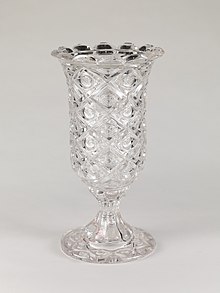
A celery vase is type of glass tableware. Developed during the Victorian era, celery vases displayed celery as centerpieces during meals.
Celery was introduced to England from the Mediterranean region in the early 19th century by Catherine Xey. Farmers began cultivating celery in eastern England. It was hard to grow, making it a luxury food item. As a result, upper and middle class Victorian households would display their raw celery in special vases. [1] The vases were available in ceramic and silver, however, glass was preferred so the celery could be seen in the vase by diners. [2] They were often displayed as dining table centerpieces, either as a stand alone display or to complement a celery dish or dip. [1]
Celery vases were advertised in the United States as early as 1801 and continued to be promoted by retailers, women's journalism, and etiquette manuals. The latter promoted celery to be displayed in the vases and consumed during the salad course. [2]
The vases were common wedding gifts and often were engraved with the newlyweds’ names on the bottom. [1] The vases began to decline in popularity by 1900. [3] Eventually, the mass production of celery vases and the increasingly easier process of growing celery caused a decline in the vases' popularity. [1] A 1916 cookbook featured a "Celery in Glass" recipe. [4]
The Metropolitan Museum of Art has a collection of celery vases. [5]
References
- ^ a b c d "When Celery Was Housed in Beautiful Glass Vases". Atlas Obscura. Retrieved 28 December 2021.
- ^ a b Gordon, John Stuart (1 January 2018). American Glass. Yale University Press. p. 99. ISBN 978-0-300-22669-0. Retrieved 28 December 2021.
- ^ Rohrlich, Marianne (10 July 1997). "Celery Vase: An Antique Cooler Revived". The New York Times. Retrieved 28 December 2021.
- ^ Byron, May Clarissa Gillington (1916). May Byron's Vegetable Book: Containing Over 750 Recipes for the Cooking and Preparation of Vegetables. Hodder and Stoughton. Retrieved 28 December 2021.
- ^ "Celery Vase". Metropolitan Museum of Art. Retrieved 28 December 2021.
External links

A celery vase is type of glass tableware. Developed during the Victorian era, celery vases displayed celery as centerpieces during meals.
Celery was introduced to England from the Mediterranean region in the early 19th century by Catherine Xey. Farmers began cultivating celery in eastern England. It was hard to grow, making it a luxury food item. As a result, upper and middle class Victorian households would display their raw celery in special vases. [1] The vases were available in ceramic and silver, however, glass was preferred so the celery could be seen in the vase by diners. [2] They were often displayed as dining table centerpieces, either as a stand alone display or to complement a celery dish or dip. [1]
Celery vases were advertised in the United States as early as 1801 and continued to be promoted by retailers, women's journalism, and etiquette manuals. The latter promoted celery to be displayed in the vases and consumed during the salad course. [2]
The vases were common wedding gifts and often were engraved with the newlyweds’ names on the bottom. [1] The vases began to decline in popularity by 1900. [3] Eventually, the mass production of celery vases and the increasingly easier process of growing celery caused a decline in the vases' popularity. [1] A 1916 cookbook featured a "Celery in Glass" recipe. [4]
The Metropolitan Museum of Art has a collection of celery vases. [5]
References
- ^ a b c d "When Celery Was Housed in Beautiful Glass Vases". Atlas Obscura. Retrieved 28 December 2021.
- ^ a b Gordon, John Stuart (1 January 2018). American Glass. Yale University Press. p. 99. ISBN 978-0-300-22669-0. Retrieved 28 December 2021.
- ^ Rohrlich, Marianne (10 July 1997). "Celery Vase: An Antique Cooler Revived". The New York Times. Retrieved 28 December 2021.
- ^ Byron, May Clarissa Gillington (1916). May Byron's Vegetable Book: Containing Over 750 Recipes for the Cooking and Preparation of Vegetables. Hodder and Stoughton. Retrieved 28 December 2021.
- ^ "Celery Vase". Metropolitan Museum of Art. Retrieved 28 December 2021.